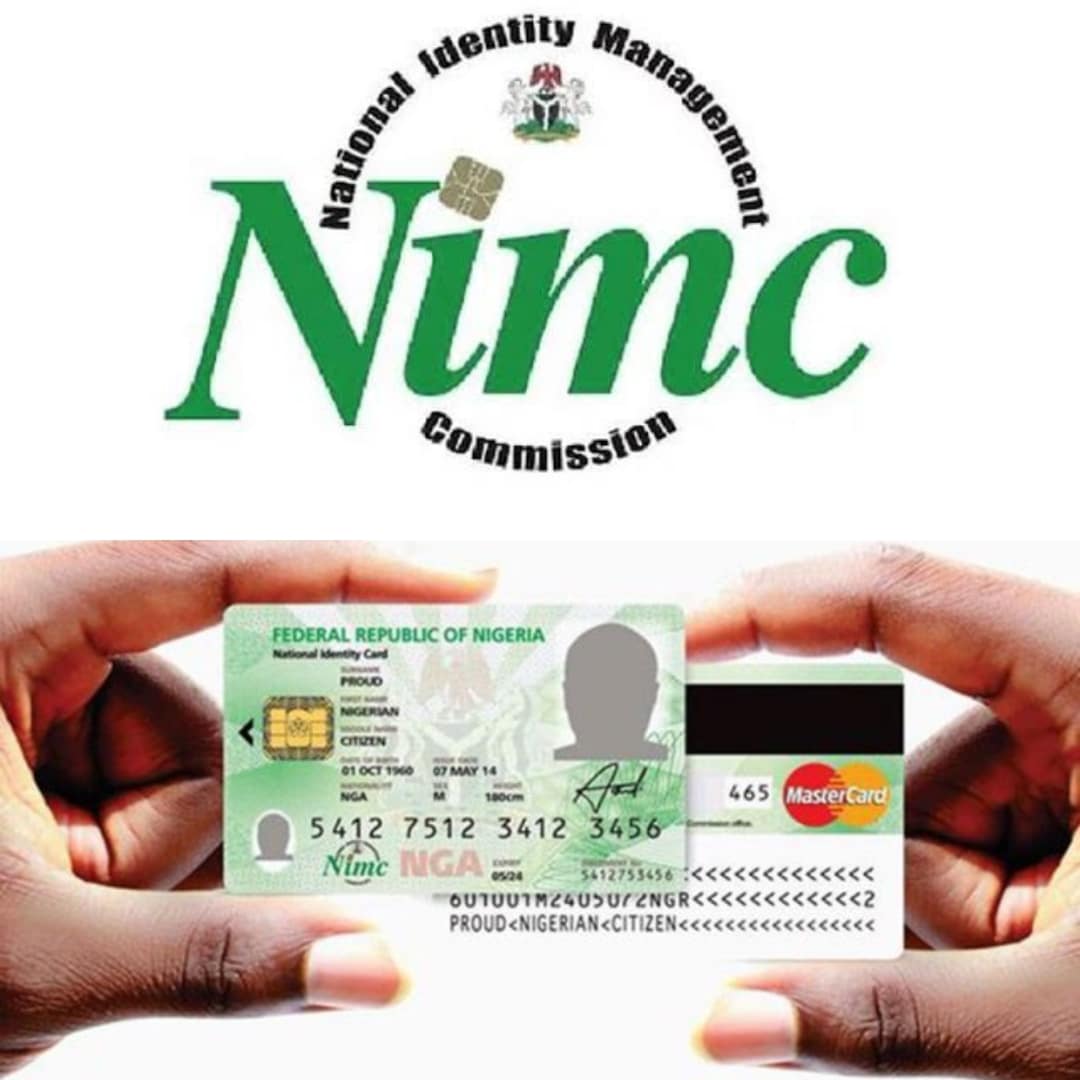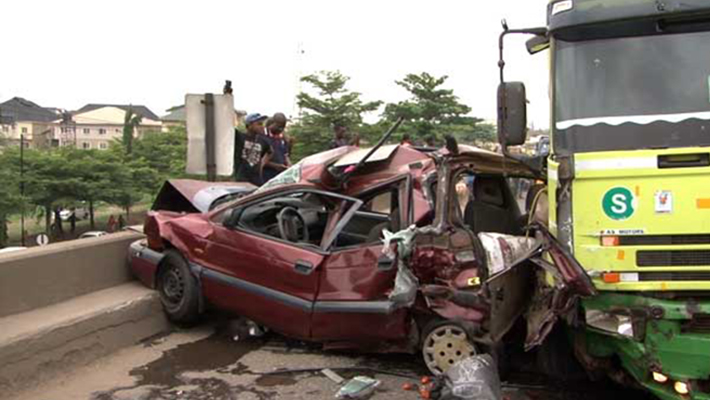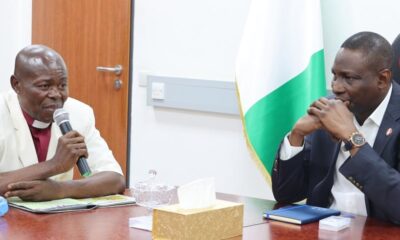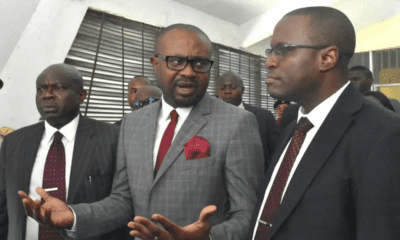Editorial
Corruption: Building accountability into Nigeria’s public sector
Corruption, no doubt, has become an household name for Nigeria. In its various forms, the ill has become a stench the Country has been known for, with malodorous perception which has sent signals of negativities in the international realm. Among comity of nations, the Country now ranks at the top of corruption ratings of various reckoning reports. Report of the 2021 Corruption Perception Index, (CPI) of the Civil Society Legislative Advocacy Centre (CISLAC) and Transparency International (TI) released in a January 2022, indicated that Nigeria ranked 154 out of 180 countries in the globe.
While the menace can no longer be isolated alone to the public sector, its grip within that sphere from where the scourge, (it is believed) zooms from, to permeate other fabrics of the society, remains too disturbing that discourse on same must never cease. The plight of the masses, recently, has gone too excruciating that the fight for sanity for what has made a country of plenty become where citizens are languishing in struggles of poverty, must be fought with continuous force till enough heat is generated for wanton and glutinous culture of corruption among public office holders begin to melt.
The records of laundering, among other forms of corruption devices, have been too expansive that the Country has suffered losses that have posed apparently irredeemable fractures. Up till now, unaccountable funds laundered abroad into foreign accounts remain unending in the effort to recover them. Several of these funds, unknown and untraceable, dwell in the limbo while struggles to recuperate the identified ones remain embedded with strings of conditions, some of which are entangled with bottlenecks.
The rigmarole of recuperating these funds nonetheless, more subjects of concern come to bear, particularly on how recuperated funds are utilised, since it remains indisputable that certain funds laundered have come to light with enough information to secure their recovery, be it those laundered abroad or those domestically laundered through dubious devices, but which tracking operations have revealed concrete evidence to guarantee and enforce their recovery.
The Federal Government, on Thursday, 11th August, 2022, had said it has recovered over N3.2billion (£6,324,627.66) of stolen funds from various jurisdictions globally from March 2021 to May 2022.
The Attorney-General of the Federation (AGF) and Minister of Justice, Abubakar Malami, disclosing this when he featured on the weekly ministerial briefing organised by the Presidential Communications Team, at the State House, Abuja, said that the government generated a total of N1.82 billion from the sale of bid forms and actual sale of forfeited properties in the first 18 months of the Buhari-led regime. He had also mentioned that an inter-ministerial committee on the audit and recovery of back years on stamp duty has so far recovered over N596million (N596,055,479.47).
While the disclosure is a good one, the thrust for accountability demands for more inquiries. Although the AGF had mentioned that the recovered foreign loots have since been disbursed into key infrastructure projects nationwide which include the Second Niger Bridge, Abuja-Kano Road and the Lagos-Ibadan expressway among others, the need for impact assessment for more detailed report is pertinent to give the reckoning frame of accountability more sense of the thrust of qualitative definition with the force of responsibility.
Nigeria increasingly has been woefully waned by the blows of corruption. The shrieking of its impacts have left perception of reproach on the Country. The profile of such stench on her internationally is gradually demeaning her status, substituting for the once glamorous accordance of repute with deforming attribution of spite.
The tag of corruption associated with the Country, if the political leaders haven’t taken note of, is one debilitating on its potential power as a nation, among others, in the world. Where the Country is weakened in perception, its potential power becomes underestimated and undermined.
Domestically, the impacts of corruption have only left the Country with myths of paradoxes. Songs of dirge have continued to permeate the nooks and crannies of the society as the scourge of unpalatable conditions of living keep waxing gross. The paradox of ‘living in poverty amidst plenty’ has become too pronounced, leaving nothing behind but lamentations.
It is deeply noteworthy that a sense of discontentment rising from the poor conditions, is gradually generating frustrations reflecting themselves in formations of aggressive rep representations in various forms. The signals are threats that must be looked into by the ruling class, majority of which have displayed flagrant insensitivity to rising flashes of resistances gradually showing forth with splashes of aggression.
In all parts of the Country, acrimonies standing on various grounds for claims of justification for actions of aggression have continued to take deep root continuously. Calls for self determination in the South-East, South-South, and much gradually rising in the South-West, have begun to take root. In the South-East, the reflection is growing into aggressive dimensions, which the government is finding difficult to tame. Just as the aggression of insurgency in the North started gradually to become an albatross, every threat has its potential to degenerate into same if the roots are not tackled. The pronounced profile of poverty in Northern Nigeria, no doubt, is known to have made an easy course for recruitments of disadvantaged persons into terror adventure. All, link back to the years of bad and distasteful governance, ridden with corruption which has deprived the Country of growth that would make good living conditions an ambience of the society for the thrust of development.
The contrary, other way round, has been the source for clusters of reactions becoming too turbulent, as confusions set in over conditions of living waxing gross. It is apparent that as the conditions wax more gross, the clusters of aggressions apparently reflecting in one form or the other as reactions to worsening conditions have been taking forceful grip on the Country. The need for the custodians of power in the Country to take a turn to the prevailing challenges is pertinent.
The culture of gluttonous selfishness which has taken grip on the disposition of public officers, a culture that has left the public sector ridden with corruption, is one endemic vulture devouring the Country’s fortune. In as much as the problem of corruption can be linked to this deforming culture, it is pertinent for the echelons of the public sector system, from the Federal Government to work concertedly with all stakeholders to harmoniously set the thrust to rejig the operating system of the Country’s public sector to take a reforming shape, such that the loosened holes condoling corruption are blocked. Such embrace demands structural reconstruction to redefine the system for institutional overhaul, to give the system a new orientation by frameworks that are automatically too virile and responsive than the subsisting order easily outplayed by opportunists who will not give a second thought to any chance to sap public funds.
Since the system is saturated with opportunists, who would always choose to occupy the space for selfish purposes to the detriment of the greatest number, only a systemic order to foreclose the cleavages that afford them the gap to exploit, would be the closest approach to block the ravaging vices of corruption which have not only worn on the Country a reproachful look, but has broken downdown its fabrics.
Editorial
Addressing the socioeconomic factors contributing to suicide rates in Nigeria


The tragic incident that unfolded in the Magboro area of Ogun State, where Victoria Idowu, a 49-year-old woman, took her own life by hanging herself on a ceiling fan, is a poignant reminder of the deep-rooted issues surrounding mental health in our society.
The discovery of her lifeless body by her son upon his return from a church service emphasises the devastating impact of such actions on loved ones and communities at large.
This unfortunate event, coupled with the recent case of Deputy Commissioner of Police Gbolaha Oyedemi, who also tragically ended his own life, sends shockwaves across the nation. Oyedemi’s untimely demise, particularly given his position within the Force Criminal and Investigation Department in Lagos State, raises questions about the unseen burdens individuals may carry, even in seemingly successful and accomplished lives.
These incidents compel us to confront the pressing need for enhanced mental health awareness, support systems, and destigmatisation efforts within our society.
While the reasons behind such tragic decisions may remain elusive, it is imperative that we foster an environment where individuals feel empowered to seek help without fear of judgment or ostracisation.
As a nation, we must prioritise mental health initiatives, invest in accessible counseling services, and promote open dialogue about mental well-being in homes, workplaces, and communities. Only through collective action and compassion can we hope to prevent further loss and support those struggling with mental health challenges.
The intertwined tales of Victoria Idowu and Deputy Commissioner Gbolaha Oyedemi paint a harrowing portrait of despair echoing across Nigeria’s landscape.
Idowu’s final act, discovered by her son amidst the echoes of church hymns, and Oyedemi’s perplexing departure, once the trusted aide to a former governor, unveil a somber truth: suicide’s haunting grip knows no bounds.
Their stories, etched with the weight of societal expectations and personal demons, illuminate a troubling trend veiling Nigeria in sorrow.
From the seasoned to the youthful, lives are lost to the silent whispers of despair, leaving behind unanswered questions and shattered hearts.
In the shadows of these tragedies, Nigeria grapples with a growing epidemic, where the specter of suicide looms larger with each passing day. The reasons, as diverse as the nation itself, intertwine threads of societal strain, economic woes, mental anguish, and a dearth of solace in the face of adversity.
Yet, amid this darkness, one truth shines unwaveringly: suicide, however tempting, is not an adequate solution. It is a plea for help lost in the silence, a cry for understanding drowned in the noise. In the face of despair, let us extend hands of compassion, build bridges of support, and shatter the silence with voices of hope. For in unity, in empathy, lies the beacon of light guiding us through the darkest of nights.
In 2019, the tragic loss of a university student in Lagos to suicide, amid the weight of academic pressures and depression, stirred conversations about mental health awareness within educational institutions.
The following year, the untimely demise of a renowned Nigerian musician, who was discovered dead by suicide in his Lagos home, cast a spotlight on the silent struggles faced by celebrities and public figures battling mental health issues.
Similarly, in 2020, the distressing case of a young woman in Abuja, who took her own life after sharing troubling messages on social media, underscored the crucial need for accessible support systems for individuals grappling with mental health crises.
Then, in 2021, the heartbreaking loss of a teenager in Kano, driven to suicide by the torment of bullying and harassment at school, sparked urgent calls for concerted action to address both bullying and mental health concerns among students.
These poignant examples serve as reminders of the pressing imperative for heightened awareness, robust support networks, and adequate resources to combat mental health challenges and stem the tide of suicide across Nigeria.
Nigeria faces a sobering reality according to the World Health Organization, grappling with one of Africa’s highest suicide rates, with a notable portion of victims being young people. Worse, the ratio of psychiatrists to population is 1:800,000.
However, there’s a beacon of hope: fostering mental health awareness and education emerges as one of the most potent tools in combating this crisis. Despite prevailing stigmas branding mental health issues as taboo or indicative of weakness, dispelling these misconceptions can pave the way for a more compassionate and supportive society. By shedding light on mental health challenges, we can dismantle barriers to seeking help and foster understanding for those battling depression and suicidal thoughts.
Moreover, addressing the recurring tide of suicides demands an overhaul of mental health services accessibility nationwide. Presently, many Nigerians, particularly in rural areas, face insurmountable hurdles in accessing vital care and support. By bridging this gap and ensuring equitable access to mental health services, we can extend a lifeline to those in dire need, fostering a nation where every individual’s well-being is prioritized and safeguarded.
Governments, healthcare providers, and non-governmental organisations could work together to expand mental health services, train healthcare professionals, and integrate mental health into primary healthcare systems.
To effectively combat the pervasive issue of suicide in Nigeria, collaboration between governments, healthcare providers, and non-governmental organisations is paramount. Together, they can expand mental health services, equip healthcare professionals with necessary training, and integrate mental health into primary healthcare systems.
Establishing robust support networks is crucial for individuals grappling with mental health challenges and suicidal ideation. This entails offering accessible avenues for seeking help, such as helplines, support groups, and online forums. Education initiatives should empower friends, family, and communities to recognize signs of depression and suicidal behavior, fostering environments of support and understanding.
Furthermore, advocating self-care practices like exercise, mindfulness, and relaxation techniques equips individuals with tools to manage their mental well-being and mitigate the risk of suicidal tendencies.
Addressing the persistent scourge of suicide demands a holistic approach that delves into its root causes while providing effective interventions and support for those in crisis. Through concerted efforts to promote mental health awareness, improve access to services, foster support networks, and empower individuals, Nigeria can forge a path towards suicide prevention and cultivate a healthier society for all.
Editorial
Nigeria’s National Identity Card initiative: A misguided venture


The recent announcement by the National Identity Management Commission (NIMC) regarding the launch of a new national identity card with payment functionality epitomises folly.
While touted as a solution to streamline identification and financial services, the collaboration between NIMC, the Central Bank of Nigeria, and the Nigeria Inter-bank Settlement System appears to be a misaligned endeavour.
In a nation burdened by limited resources and an array of urgent challenges, Nigeria’s pursuit of grandiose projects with questionable benefits is a luxury it cannot afford.
Despite its surface appeal, closer scrutiny reveals a troubling trend of duplication, bureaucratic inefficiency, and a glaring gap between governmental aspirations and citizens’ realities.
This venture echoes previous attempts to overhaul the national identification system, notably the ill-fated 2006 concession awarded to Chams.
That endeavour, marred by allegations of collusion and technical sabotage, squandered over $100 million, leaving a bitter legacy of failure. In light of this history, skepticism abounds regarding the prospects of the current initiative.
As Nigeria grapples with pressing socio-economic issues, including poverty, insecurity, and inadequate infrastructure, it is imperative that resources be directed towards initiatives with tangible benefits for the populace.
The proposed national identity card, with its payment functionality, appears to be a misplaced priority in this context.
Rather than embarking on ventures with dubious returns, Nigerian authorities must prioritise accountability, transparency, and citizen-centric policies. The nation cannot afford to repeat past mistakes at the expense of its long-suffering populace.
Furthermore, the purported justification for the new card – facilitating access to “multiple government intervention programs” for the financially marginalised – falls short when juxtaposed with the formidable hurdles Nigerians encounter in simply linking their National Identification Number (NIN) to vital services like mobile phone accounts or bank facilities.
The pandemonium and exasperation prevalent in these endeavours, resulting in citizens squandering valuable time and resources, should stand as a stark warning regarding the government’s competence in executing such extensive identity management schemes.
Moreover, if the concern is the proliferation of identification documents in Nigeria – from international passports and driver’s licenses to voter cards and the existing national ID card – this newspaper holds that this mosaic of identification systems not only spawns unnecessary confusion and bureaucratic headaches for citizens but also casts doubt on the government’s capacity to efficiently orchestrate and amalgamate these diverse platforms.
Instead of tackling these persistent issues head-on, the introduction of yet another identity card appears to be an ill-conceived effort to reinvent the wheel, with scant consideration for the practical challenges confronting Nigerians in their daily lives.
In a nation grappling with limited resources and a plethora of pressing needs, the decision to allocate billions of naira to this new card project is both confounding and deeply concerning. Many would argue that the government’s time and financial resources could be more effectively directed towards enhancing existing infrastructure, fortifying public services, and confronting the numerous socioeconomic challenges plaguing the country.
From the dire state of the healthcare system to the ongoing insecurity that has resulted in significant loss of life, there exist far more urgent issues warranting the government’s attention and, critically, its constrained financial resources.
Moreover, the assertion that the new card will facilitate access to “government intervention programs” for the financially marginalised raises concerns about introducing yet another bureaucratic barrier for vulnerable Nigerians.
Instead of introducing a new identification system, the government’s focus should be on refining and strengthening existing social welfare programs, ensuring they are accessible, efficient, and tailored to meet the needs of the populace.
The government’s ambition to distribute the new card to approximately 104 million citizens is cause for concern. Undertaking such a monumental task without a clear and comprehensive plan is likely to result in further delays, logistical complexities, and a considerable squandering of public funds – resources that could have been channeled towards making tangible improvements in the lives of Nigerians.
In essence, the rollout of the new national identity card with payment functionality reflects a recurring pattern in Nigerian governance: the inclination towards grand, top-down initiatives that often fall short of addressing the underlying issues fueling the country’s challenges.
Instead of pursuing this dubious venture, the government’s focus should shift towards strengthening existing identification systems, fostering better coordination among government agencies, and prioritising investments in areas directly impacting the lives of Nigerians.
As a nation, we must resist the temptation of embracing flashy new projects that promise quick fixes to complex problems.
Achieving genuine progress demands a nuanced, collaborative, and evidence-based approach that acknowledges the distinct needs and challenges of diverse communities.
It’s high time for the government to abandon this latest identity card scheme and redirect its efforts towards more impactful and sustainable initiatives that truly serve the citizens it is sworn to uplift.
Editorial
Articulated vehicles and the scourge of avoidable deaths


Nigerians across the country continue to die utterly preventable deaths thanks to a lack of political will on the part of its leaders. It is an ugly fate thrust upon its citizens to live in a country whose economy is built upon the blood of the ordinary people, not out of sacrifice, but nonchalance. Articulated vehicles wipe out families, dreams, and human capital in one fell swoop. Press statements from the leaders are not enough. We need the May 2024 immediacy of the Tinubu administration in this sector too.
Last week, a falling container killed a woman in the Ogudu area of Lagos. The woman was inside a car when the fully loaded 40ft Mack articulated truck fell on it, leading to her instant death, according to the Lagos State Traffic Management Authority (LASTMA).
In October 2023, a businessman identified as Akuma Kalu, was crushed to death by a 40-feet container that fell on his car along the failed portion of Etche-Ngokpala road in Etche Local Government Area of Rivers state.
In September 2023, five women died in a fatal accident that occurred in the early hours of Friday at Odumodu Junction, Nteje, Oyi Local Government Area along Awka Road, Anambra State. As usual, the container of the truck fell upon the bus carrying these people, killing them. We could go on and on. The story remains the same: tragedy upon tragedy.
Every year, the Federal Road Safety Commission, FRSC, does sensitisation with little result to show for it because the arm of the law is too short to punish offenders at the root of the problem. The constant assault on the senses has led to a desensitisation on the part of the populace. Month after month, another story of a truck that erases a family, or multiple families because its brakes fail, or its container is overturned. The combination of the death of empathy on the part of leaders and the emotional exhaustion of the citizens will lead Nigeria down the path of a dystopia.
The governors of each state have a responsibility to institute laws to protect the indigenes. This, the Federal Government must also do nationwide. The FRSC has rules and regulations for trucks. The Government needs to only enforce these rules. Enough of blaming the trucks themselves because they are not the evil entities. The lack of accountability and a weak system perpetuates the dilemma.
The political class should not wait until Nigeria happens to one of their own before acting as is usually the case. Most cases bear the mark of immediate fatality. By the time a family member experiences it, it would have already been too late. We have hope that this administration will do what it takes to restore hope to the common man. Time to act is now.
-
Finance3 months ago
Court orders Sen. Victor Umeh to repay N136m bank debt to AMCON
-



 Abuja Update2 months ago
Abuja Update2 months agoUNDP, FG partnership needed to achieve inclusion, equity- Minister
-
Abuja Update4 weeks ago
Banks drive stock market performance with N147bn gain
-



 Infotech3 weeks ago
Infotech3 weeks agoWorld Backup Day: NITDA urges Nigerians to ensure backup of data
-
capital market2 years ago
Rt.briscoe, FBNH, Others halts negative performance of stock market
-



 Health2 weeks ago
Health2 weeks agoImmunisation: FG, GAVI seek synergy with Sokoto Govt.
-
Infotech2 weeks ago
Forex for Beginners: Unveiling the currency exchange and how to trade it
-
Submission Guidelines4 months ago
CALL FOR SUBMISSIONS: POETRY COLUMN-NND








